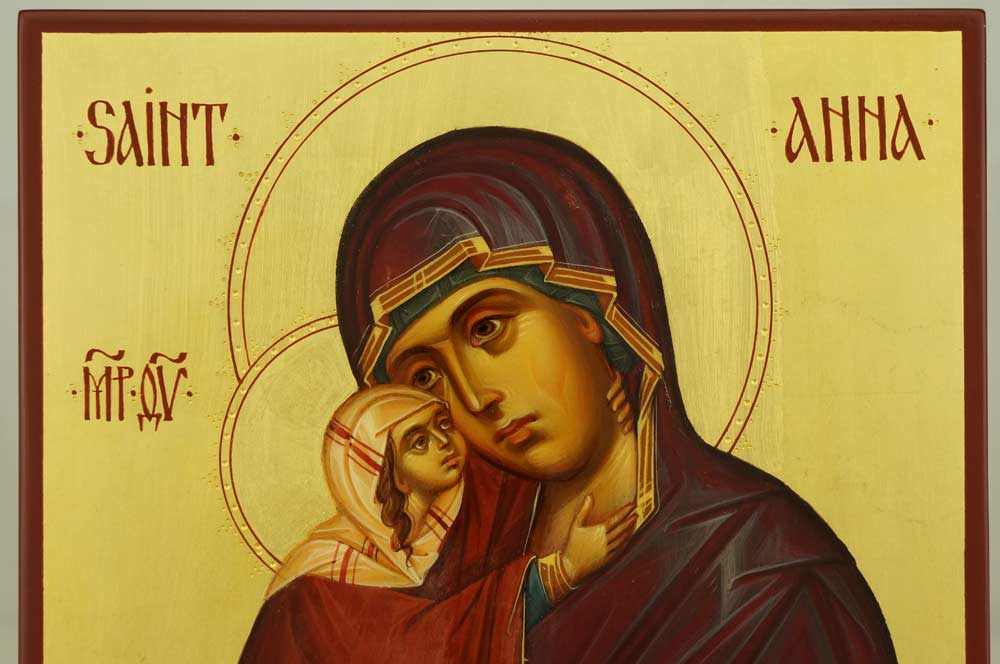Some THOUGHTS ON THE IMMACULATE CONCEPTION (Sunday, December 8 ) by Sister Doctor Vassa Larin.
“…And Joseph and His mother marveled at those things which were spoken of Him. Then Simeon blessed them, and said to Mary His mother, ‘Behold, this Child is destined for the fall and rising of many in Israel, and for a sign which will be spoken against (yes, a sword will pierce through your own soul also), that the thoughts of many hearts may be revealed.’” (Lk 2: 33-35)
Today December 8 my Roman Catholic friends usually celebrate the “Immaculate Conception of Mary.” This feast is based on a teaching officially recognized by the Catholic Church in 1854, when Pope Pius IX declared: “The most Blessed Virgin Mary, in the first instant of her conception, by a singular grace and privilege granted by almighty God, in view of the merits of Jesus Christ, the Savior of the human race, was preserved free from all stain of original sin.”
While the “immaculate conception” is not a thing in Orthodox Christian tradition (the whole point is moot, because we have no clear teaching on “original sin”), tomorrow, on December 9 (a day following the Roman Catholic feast), the Orthodox celebrate a feast called, perplexingly, “The Conception *by the Holy Righteous Anna* of the Most Holy Theotokos.” In the Slavonic liturgical books, it is also called simply, “The Conception of the Holy Righteous Anna.” It’s a perplexing title, I think, because the Orthodox Church certainly does not teach that *only* Anna conceived the Theotokos, without Joachim. But there is an accentuation of St. Anna’s role in this picture, which we also see in the iconographic tradition, which more often depicts St. Anna holding the Theotokos (in the same position we see on icons of the Theotokos holding the Christ-child) than both Joachim and Anna with the Theotokos. I’ll also note this is different from the way the Conception of St. John the Baptist is traditioned, – it’s never called “The Conception of (or by) the Holy Righteous Elisabeth.”
I think that in both East and West, the uniquely-pivotal vocation of the Theotokos in Salvation History makes her uniquely mystifying. Fr. George Florovsky noted that her transitional role, between the time of the “old” covenant and the time of the “new,” makes the *timing* of her own salvation-process difficult to establish. For example, notes Florovsky, she experienced Pentecost already at the Annunciation, when the Holy Spirit came upon her and the power of the Most High overshadowed her. And we don’t know if she was baptised in the usual sense, or needed to be? I think the above-described Roman Catholic teaching on the Immaculate Conception seems to place her baptismal moment at her very conception.
And yet she is one of us, – and not any illustrious one of us, in all the externals. She is poor, an orphan, betrothed fictitiously to a widowed carpenter named Joseph, because she had nowhere to go after she had to leave the Temple. And she did not have foreknowledge about her Child’s cross and her own, apparently, because together with Joseph she “marveled at those things which were spoken of Him.” She is being led on the difficult journey of her vocation, like most humans, not knowing what will come next. This is why Simeon warns her, “yes, a sword will pierce through your own soul also,” because she evidently did not know this, either, and he was given this prophetic word to pass on to her, to prepare her.
In Orthodox tradition, we don’t share the Roman Catholic teaching on the Immaculate Conception of Mary, (and I don’t say this in the interests of Catholic-bashing, but just FYI), because we believe that this teaching diminishes the humanity of the Theotokos, and hence it diminishes the humanity of the One born from her womb. In Orthodox Christian teaching, her own birth from Sts. Joachim and Anna was as human as all our births. Nonetheless, as I reflected above, I think the *timing* of her salvation-journey, which bridged the Old and the New Covenants, remains a mystery that results in some head-scratching about it in both East and West. Thank you, in any event, Most Holy Theotokos, for blessing all of us, Catholics and Orthodox and the rest of us, by your full-of-grace presence in our human-divine midst.
